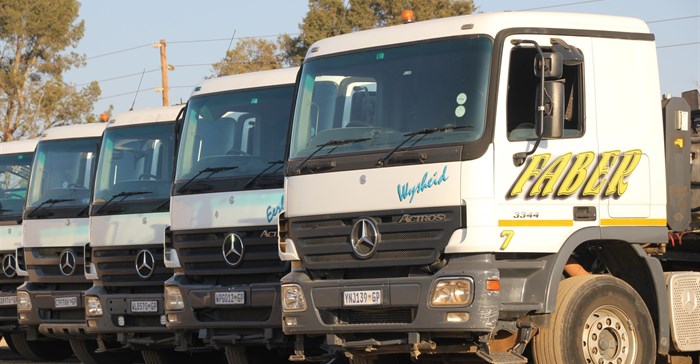
Subscribe & Follow
#AfricaMonth
Jobs
- Journalist Johannesburg
- Assistant Warehouse Storeman Cape Town
#EntrepreneurMonth: Steady growth amid industry boom-and-bust cycles

The water tanker set the course of his life when it broke down one day and Faber asked his employer for a day off so that he could go and fix it. When his employer refused, Faber quit his apprenticeship. He has been running his trucking company ever since. Today, the 48-year-old Faber owns 30 mostly specialised crane trucks that haul heavy cargo such as bricks, paving, cement and concrete pipes. He employs 60 staff members on the road and a further dozen at the office in the Sunderland Ridge Industrial Area in Centurion.
Its own Mercedes-Benz accredited workshop
A remarkable feature of Faber Vervoer is the fact that it has its own mechanical workshop officially accredited by Mercedes-Benz, staffed by four Benz mechanics. This had nothing to do with Faber's early interests in becoming a mechanic. Rather, it is purely a business decision, explains Faber. “If I have a problem with a clutch on one of my trucks and I have it fixed at an outside workshop, I'd be lucky if it costs me less than R50,000, and it takes a week to get my truck back. Now, I simply buy the parts for R7,000, fix it in my own workshop and it's ready to go the next day.”
Faber notes that the window for fleet owners like himself to set up their own accredited workshops is closing fast. In order to rent the computers needed to service modern truck engines, the vehicle manufacturers require the workshop to be officially accredited, and there seems to be a growing resistance from the manufacturers to accredit small, fleet-specific workshops.
Truck technology
Faber counts himself lucky in another way too. Over the years, he has witnessed huge changes in truck technology. Back when he started, he was able to buy second-hand vehicles and service them himself, allowing him to keep his costs low. No specialised digital equipment were required to service a truck then. By the time the new trucks with sophisticated electronic systems came onto the market, Faber Vervoer was financially strong enough to buy new vehicles and to have them serviced by accredited mechanics, and later in its own workshop. Overall, the technological changes have been good, says Faber. Lighter bodies have made greater payloads possible, and a modern truck can clock up a million kilometers.
Steady growth amid tough economic times
Faber Vervoer has managed to maintain its steady growth despite its fair share of ups and downs. The business is closely tied to the construction industry, notorious for its boom-and-bust cycles. The toughest time for Faber was around the global the financial crisis which brought building projects to a halt. Even today the effects can still be felt, says Faber, who runs two non-crane trucks for hauling agricultural produce so that the business does not keep all its eggs in the construction industry basket.
What makes Faber Vervoer's steady growth remarkable is the fact that it has never signed a long-term contract with any of its regular corporate clients. Faber is philosophical about it, explaining that it simply does not happen in such a cyclical industry. The only way in which Faber Vervoer can ensure ongoing client support is by maintaining excellent service levels.
Another constant in the Faber Vervoer story is its bank. From the beginning, Faber had banked with Standard Bank and has over the years concluded more than 100 hire-purchase deals to replace the aging trucks in his fleet. Today, about half the Faber fleet is under hire-purchase finance. For many years he has also made use of Standard Bank Fleet Management's fleet cards. Recently, however, Faber has installed his own fuel depot for total control over his fleet's diesel consumption. With larger fuel tanks installed on his trucks, most of them can reach even the far-flung corners of South Africa.
Looking forward, Faber says he plans to stop growing the number of vehicles in his fleet, but rather aim to increase the company's asset base by becoming debt free in the same steady way that he has managed to build his fleet.








